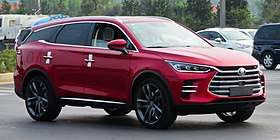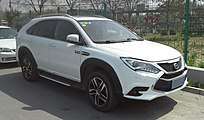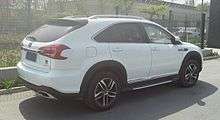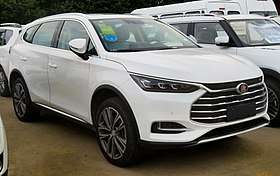BYD Tang
The BYD Tang is a crossover SUV, available as an all-electric vehicle, as a plug-in hybrid and as an ICE vehicle, manufactured by BYD. The first generation was introduced at the 2014 Beijing Auto Show and was available as a plug-in hybrid only. The vehicle gets its name from the Tang Dynasty, known as the most prosperous of all the great Chinese Dynasties.[1] Retail deliveries began in China in June 2015.[2] The Tang was the top selling plug-in electric passenger car in China in 2016,[3] and the world's top selling plug-in hybrid in 2016. Also, the Tang ranked as the world's third best-selling plug-in car that year.[4] Since inception, 101,518 units were sold in China through December 2018.[3][5][6][7]
| BYD Tang | |
|---|---|
 | |
| Overview | |
| Manufacturer | BYD |
| Production | 2015–present |
| Body and chassis | |
| Class | Compact car / Crossover sport utility vehicle |
| Body style | 5-door SUV |
| Platform | all-electric/plug-in hybrid/gasoline |
The second generation debuted at Auto China in April 2018.[8] In the all-electric variant, known as the BYD Tang 600 and 600D, the battery capacity is 82.8 kWh.[9] That variant is also going to be sold in Europe (in Norway) starting in 2020.[10]
First Generation
| BYD Tang (First generation) | |
|---|---|
 | |
| Overview | |
| Manufacturer | BYD |
| Production | 2015–2018 |
| Body and chassis | |
| Class | compact (C) CUV |
| Body style | 5-door SUV |
| Layout | Front-engine, front-wheel-drive layout |
| Related | BYD S6 BYD Qin |
| Powertrain | |
| Engine | 2.0 L BYD487ZQA I4 (turbo petrol) 151 kW (202 hp)[1] |
| Electric motor | Two 110 kW (150 hp)[1] |
| Transmission | Electric Automatic |
| Battery | 18.4 kWh lithium iron phosphate battery pack[1] |
| Electric range | 80 km (50 mi)[1] |
| Chronology | |
| Successor | BYD Tang II |
The BYD Tang is a plug-in hybrid Crossover sport utility vehicle (CUV) developed by BYD based on the BYD S6. Its 18.4 kWh lithium iron phosphate battery pack delivers an all-electric range of 80 km (50 mi). The Tang was introduced at the 2014 Beijing Auto Show[1] and was produced to at least 2018.
Specifications
The Tang is powered by a 2.0-liter internal combustion engine which delivers 151 kW (202 hp) and 320 N⋅m (240 lbf⋅ft) of torque; and two electric motors, front and rear, each rated at 110 kW (150 hp) and 250 N⋅m (180 lbf⋅ft) in the entry-level Tang, and 300 N⋅m (220 lbf⋅ft) in the performance model. Total system output is 371 kW (498 hp) and 820 N⋅m (600 lbf⋅ft) for the entry-level model, and 411 kW (551 hp) and 870 N⋅m (640 lbf⋅ft) for the concept performance model. The latter accelerates from 0 to 100 km/h in 4.5 seconds and the entry level in 4.9 seconds. The Tang is fitted with BYD's second generation Dual Mode (DM) system which allows drivers to switch between all-electric mode (EV mode) and hybrid electric mode (HEV mode).[1] This vehicle is an electric version of the BYD S7.
 BYD Tang front.
BYD Tang front. BYD Tang rear.
BYD Tang rear.
Second Generation
| BYD Tang (Second generation) | |
|---|---|
 BYD Tang II | |
| Overview | |
| Manufacturer | BYD |
| Production | 2018–present |
| Designer | Wolfgang Egger |
| Body and chassis | |
| Class | midsize Crossover SUV |
| Body style | 5-door SUV |
| Layout | Front-engine, full-time electric all-wheel-drive |
| Related | Denza X |
| Powertrain | |
| Engine | 2.0 L BYD487ZQA I4 (turbo petrol) 151 kW (202 hp)[1] Front electric motor AC permanent magnet synchronous motor 110 kW (150 hp) Rear electric motor AC permanent magnet synchronous motor 180 kW (240 hp) |
| Transmission | 6-speed DCT |
| Battery | Lithium NCM batterypack[1] |
| Electric range | 80 km (50 mi)[1] / 100 km (62 mi) |
| Dimensions | |
| Wheelbase | 2,820 mm (111 in) |
| Length | 4,870 mm (191.7 in) |
| Width | 1,950 mm (76.8 in) |
| Height | 1,725 mm (67.9 in) |
| Chronology | |
| Predecessor | BYD Tang I |
Featuring BYD's new family design language and previewed by the BYD Dynasty concept car in 2017, the second generation BYD Tang with completely redesigned exterior and interior debuted at Auto China in April 2018. The new model line will include purely gasoline powered versions and pure electric versions (Tang EV600 and EV600D)[11] besides plug-in hybrid ones, with powertrains exactly the same as the first generation.[8] The Tang will be also the first vehicle to be exported to Europe, starting with Norway late this year.[12]
 BYD Tang II EV
BYD Tang II EV BYD Tang II (petrol version) front
BYD Tang II (petrol version) front.jpg) BYD Tang II (petrol version) rear
BYD Tang II (petrol version) rear
Sales
Retail deliveries of the BYD Tang began in China in June 2015.[2] The plug-in SUV pricing starts at CN¥300,000 (~ US$48,000) before any applicable government incentives.[13] The Tang is estimated in its Norwegian launch at RMB 260,000($36,000 US dollars), half the price of western competitors.
A total of 18,375 units were sold in China in 2015,[5] and with 31,405 units delivered in 2016, the Tang listed as the top selling plug-in electric car in China that year.[3] The BYD Tang also ranked as the world's best-selling plug-in hybrid and as the third best-selling plug-in car in 2016.[4] Until December 2016, the BYD Tang ranked as the world's all-time tenth most sold plug-in electric car.[4] Tang sales in China totaled 14,592 units in 2017,[6] and rose to 37,146 in 2018.[7] Cumulative sales since inception totaled 101,518 units in China through December 2018.[3][5][6][7]
See also
References
- Mike Millikin (2015-01-23). "BYD Tang SUV PHEV available for pre-orders starting at $48.3K before incentives; twice that for performance model". Green Car Congress. Retrieved 2015-01-31.
- Staff (2015-07-17). "Chinese EV Sales Ranking in the First Half of 2015". China Auto Web. Retrieved 2015-08-02.
- Staff (2017-01-19). "Best-selling China-made EVs in 2016". China Auto Web. Retrieved 2017-01-25. Three BYD Auto models topped the Chinese ranking of best-selling new energy passenger cars in 2016. The BYD Tang SUV was the top selling plug-in electric car in China in 2016 with 31,405 units sold, followed by the BYD Qin with 21,868 units sold, and ranking third overall in 2016 was the BYD e6 with 20,605 units.
- Cobb, Jeff (2017-01-31). "Tesla Model S Is World's Best-Selling Plug-in Car For Second Year In A Row". HybridCars.com. Retrieved 2017-01-31. See also detailed 2016 sales and cumulative global sales in the two graphs.
- Staff (2016-01-14). "Best-selling China-made SUVs in 2015". China Auto Web. Retrieved 2016-01-17. A total of 18,375 Tangs were sold in China in 2015.
- Kane, Mark (2018-01-26). "BYD #1 In World For Plug-In Electric Car Sales In 2017, Beats Tesla Again". InsideEVs. Retrieved 2018-10-31. During 2017, BYD Qin sales totaled 20,738 units and BYD Tang totaled 14,592 units.
- Kane, Mark (2019-01-14). "BYD Sold Record 37,000 Electric Cars In December 2018". InsideEVs.com. Retrieved 2019-01-14. BYD Tang sales totaled 37,146 units in 2018.
- "【图】2018北京车展:新唐DM补贴后预售25-30万_汽车之家". www.autohome.com.cn. Retrieved 2018-04-28.
- https://insideevs.com/news/351456/byd-tang-600-600d-specs
- https://insideevs.com/news/419889/byd-enters-european-ev-car-market-norway
- https://insideevs.com/news/340965/byd-introduces-tang-ev600-with-828-kwh-battery/
- "BYD announces expansion into Europe". www.autocar.co.uk. Retrieved 2020-05-06.
- Tycho De Feijter (2015-05-26). "BYD Tang hybrid super SUV will hit the Chinese market on July 6". Car News China. Retrieved 2015-06-12.